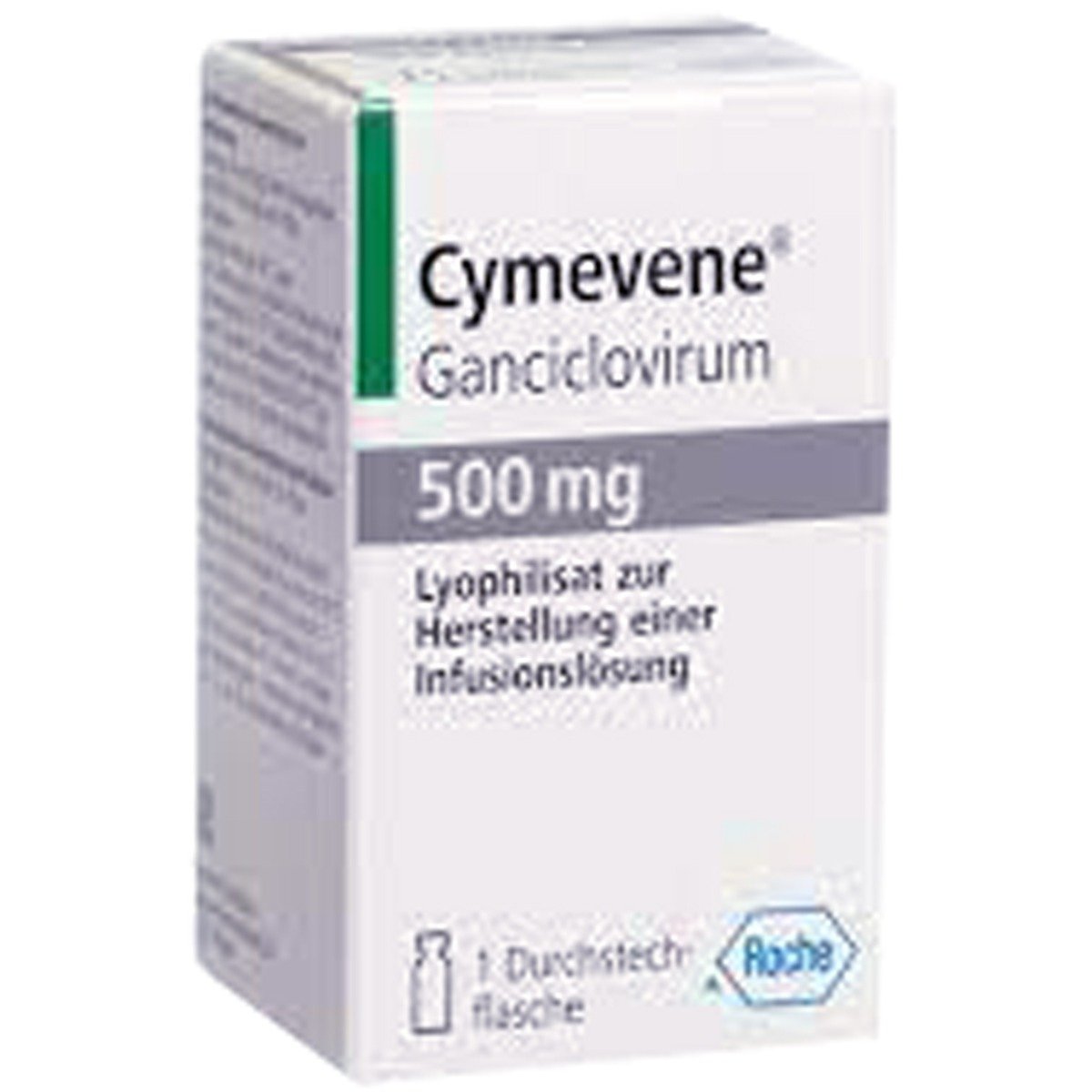Ganciclovir
About Ganciclovir
Ganciclovir belongs to a class of drugs known as antivirals, which are used to treat viral infections. It plays a vital role in treating Cytomegalovirus infection in immunosuppressed people (having HIV/AIDS) or those who have undergone bone marrow or organ transplantation. Cytomegalovirus infection is a common herpes virus infection that often presents with no symptoms or mild symptoms, such as fever and fatigue. Severe infection may affect the eyes, brain, or other internal organs.
Ganciclovir contains Ganciclovir, an antiviral medication. It works by preventing the multiplication of viruses in human cells by acting on their DNA, resulting in a decrease in viral overload and the production of new viruses. Hence, this helps in clearing up the infection.
Take Ganciclovir as prescribed by your doctor. It can be taken with or without food. You are advised to take Ganciclovir for as long as your doctor has prescribed it for you, depending upon your medical condition. In some cases, you may experience nausea, headache, dizziness, fever, vomiting, diarrhoea, increased liver enzymes, and stomach pain. Most of these side effects of Ganciclovir are temporary, do not require medical attention, and gradually subside over time. However, if the side effects persist, contact your doctor immediately.
Do not take Ganciclovir if you are allergic to it, aciclovir or any of its ingredients. Never encourage self-medication or suggest your medicine to someone else, even if the symptoms occur similarly. Check with your doctor if you're pregnant, currently breastfeeding or taking any other prescribed or non-prescribed medicines. Use protection while having sexual intercourse to avoid the transfer of infection to your partner. If you have a weak immune system, please inform your doctor before taking Ganciclovir, as a dose adjustment may be required.
Uses of Ganciclovir
Medicinal Benefits
Ganciclovir contains Ganciclovir, which belongs to a class of drugs known as antiviral medicines. It is used to treat viral infections. It plays a vital role in treating Cytomegalovirus Infection in Immunosuppressed people who have undergone bone marrow or organ transplantation. In addition to this, it also reduces the risk of blindness in people with serious eye infections (CMV retinitis). It works by preventing the multiplication of viruses in human cells by acting on their DNA, resulting in decreased viral overload and new virus production. Hence, this helps in clearing up the infection.
Directions for Use
- Ganciclovir can be taken with or without food, as advised by a doctor.
- Follow your doctor's instructions on the dosage and timing of this medication to ensure safety.
- Swallow the medicine as a whole with a glass of water.
- Do not crush, break, or chew it.
Storage
Side Effects of Ganciclovir
- Headache
- Dizziness
- Nausea
- Fever
- Vomiting
- Diarrhea
- Increased liver enzymes
- Stomach pain
Drug Warnings
- Do not take Ganciclovir if you are allergic to Ganciclovir or any of its ingredients.
- Inform your doctor if you have or have ever had anaemia (red blood cells do not bring enough oxygen to all parts of the body), neutropenia (less than a normal number of white blood cells), thrombocytopenia (less than a normal number of platelets) or other blood or bleeding problems as Ganciclovir may lower the blood cell count or if you have received or are receiving radiation (X-ray) therapy.
- If you experience any of the following symptoms, call your doctor immediately: excessive tiredness, pale skin, headache, dizziness, confusion, fast heartbeat, difficulty falling asleep or staying asleep, weakness, shortness of breath, unusual bleeding or bruising or sore throat, fever, chills, cough or other signs of infection.
Drug Interactions
Drug-Disease Interaction: Ganciclovir is known to interact in patients with low blood cell count, cancer, osteoporosis (bone problem), organ transplant rejection, bowel disorder, arthritis, kidney or liver problem.
Drug-Food Interaction: Ganciclovir interacts with non-prescription medications, vitamins, nutritional supplements and herbal products you are taking or plan to take.
Drug-Drug Interaction: Ganciclovir is known to interact with blood thinners (warfarin), cancer medications (dapsone, flucytosine, heparin), immunosuppressants (azathioprine, cyclosporine, methotrexate, sirolimus, tacrolimus), medications to treat AIDS (didanosine, zalcitabine, zidovudine, adefovir), pain killers (aspirin, ibuprofen, naproxen), steroids (dexamethasone, prednisone).
Drug-Drug Interactions Checker List:
Safety Advice

Alcohol
cautionAlcohol is not known to cause any unpleasant side effects if taken along with Ganciclovir. But intake of alcohol with Ganciclovir may damage your liver. So intake of alcohol should be avoided with Ganciclovir.

Pregnancy
cautionGanciclovir is a pregnancy Category C medicine. It is not known whether Ganciclovir will affect pregnant women or fetus or not. Hence, the intake of Ganciclovir should be only if prescribed and under medical supervision.

Breast Feeding
cautionGanciclovir is a pregnancy Category C medicine. It is not known whether Ganciclovir will pass through the milk in breastfeeding women or not. Hence, Ganciclovir should only be taken if prescribed by a doctor and under medical supervision.

Driving
unsafeGanciclovir can affect alertness and coordination. So, operating machinery which requires concentration should be avoided.

Liver
consult your doctorGanciclovir to be taken with caution, especially if you have a history of liver diseases/conditions. The dose may have to be adjusted by your doctor.

Kidney
consult your doctorGanciclovir to be taken with caution, especially if you have a history of Kidney diseases/conditions. The dose may have to be adjusted by your doctor.

Children
cautionGanciclovir is not recommended for children below 12 years as its safety and efficacy are not established.
Habit Forming
Diet & Lifestyle Advise
- Avoid alcoholic beverages with Ganciclovir as it can make you dehydrated and may affect your sleep.
- Try to include heart-healthy omega-3 fatty acid-containing foods and drinks in your daily diet. You can also use low-fat cooking oils, such as olive oil, soybean oil, canola oil, and coconut oil.
- Include turmeric or yellow mustard in your diet to avoid constipation caused by antiviral drugs, and increase the intake of fluids to stay hydrated.
- Try to reduce emotional and physical stress by spending time with family or whatever makes you happy.
- Eat a healthy and balanced diet, and ensure you get at least 8 hours of sleep a day for a speedy recovery.
- If you are going out in strong sunlight, please wear a lip balm with SPF 15 or higher, as Ganciclovir may be sensitive to UV and sunlight.
Special Advise
- All types of blood cells should be monitored regularly as Ganciclovir may lower the cell count.
- Ganciclovir should be taken just after a meal, as food increases the absorption of Ganciclovir in the body.
Patients Concern
Disease/Condition Glossary
Cytomegalovirus Infection: It is a common herpes virus infection that may have no symptoms or symptoms like fever and fatigue. Severe infection may affect the eyes, brain or other internal organs. It is spread through nonsexual contact by body secretions in people who have undergone an organ transplant or are immunosuppressed and through sexual contact.
CMV retinitis: It is an eye infection caused by the herpes virus leading to inflammation of the eye's retina. If left untreated, it can lead to blindness.
FAQs
Ganciclovir is used to treat viral infections. It plays a vital role in treating Cytomegalovirus infection in immunosuppressed people (having HIV/AIDS) or those who have undergone bone marrow or organ transplantation.
It contains Ganciclovir, an antiviral agent that is specifically effective against certain viral infections such as cytomegalovirus (CMV). Ganciclovir works by entering virus-infected cells and interfering with the replication of viral DNA, which is essential for the virus to multiply. By inhibiting DNA synthesis, it prevents the virus from spreading further in the body. As a result, it helps control the infection, reduce viral load, and support recovery.
The most common side effects of Ganciclovir are headaches, dizziness, nausea, fever, vomiting, diarrhoea, and stomach pain. Most of these side effects of Ganciclovir are temporary, do not require medical attention, and gradually resolve over time. However, if the side effects are persistent, reach out to your doctor.
No, you should not stop taking Ganciclovir without consulting the doctor, even if you feel better. The symptoms may improve, but the infection may not be completely cured. Therefore, it is advisable to continue the treatment at the prescribed dose and duration for optimal results.
Ganciclovir may affect fertility. It may temporarily or permanently stop men from producing sperm and reduce fertility in women. So, if you are planning a baby, inform your doctor before taking Ganciclovir. Also, wear a condom during sexual intercourse to avoid the transfer of infection to the female counterpart.
No, Ganciclovir should be taken as advised by the doctor in terms of dose and duration. If you take it in a dose greater than the recommended amount, it may cause unpleasant side effects. If you think your symptoms are not improving, please consult your doctor.






